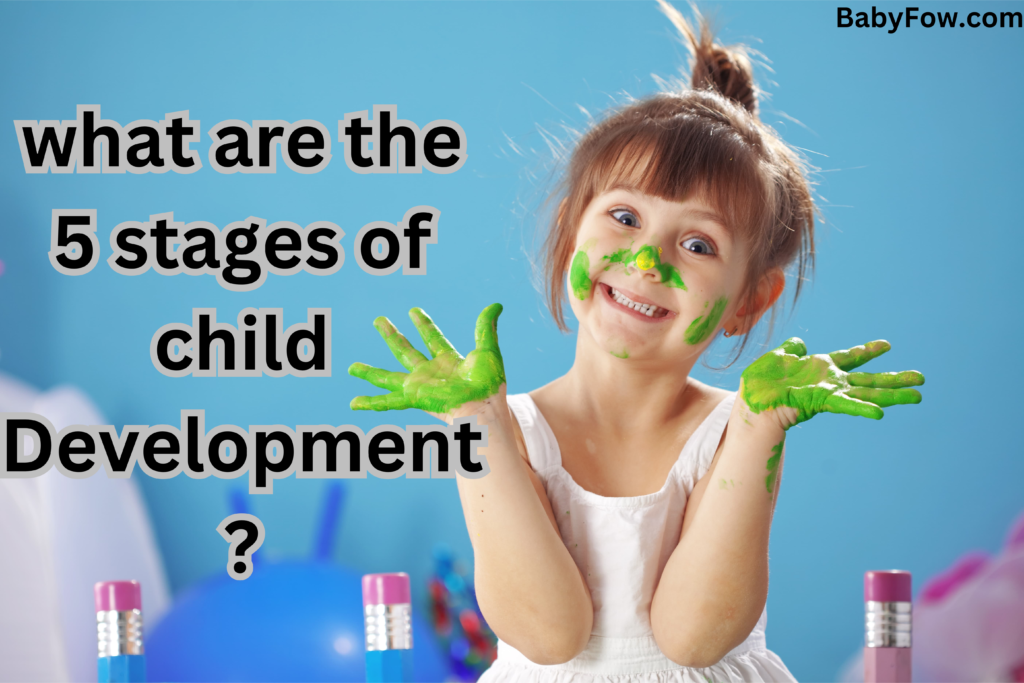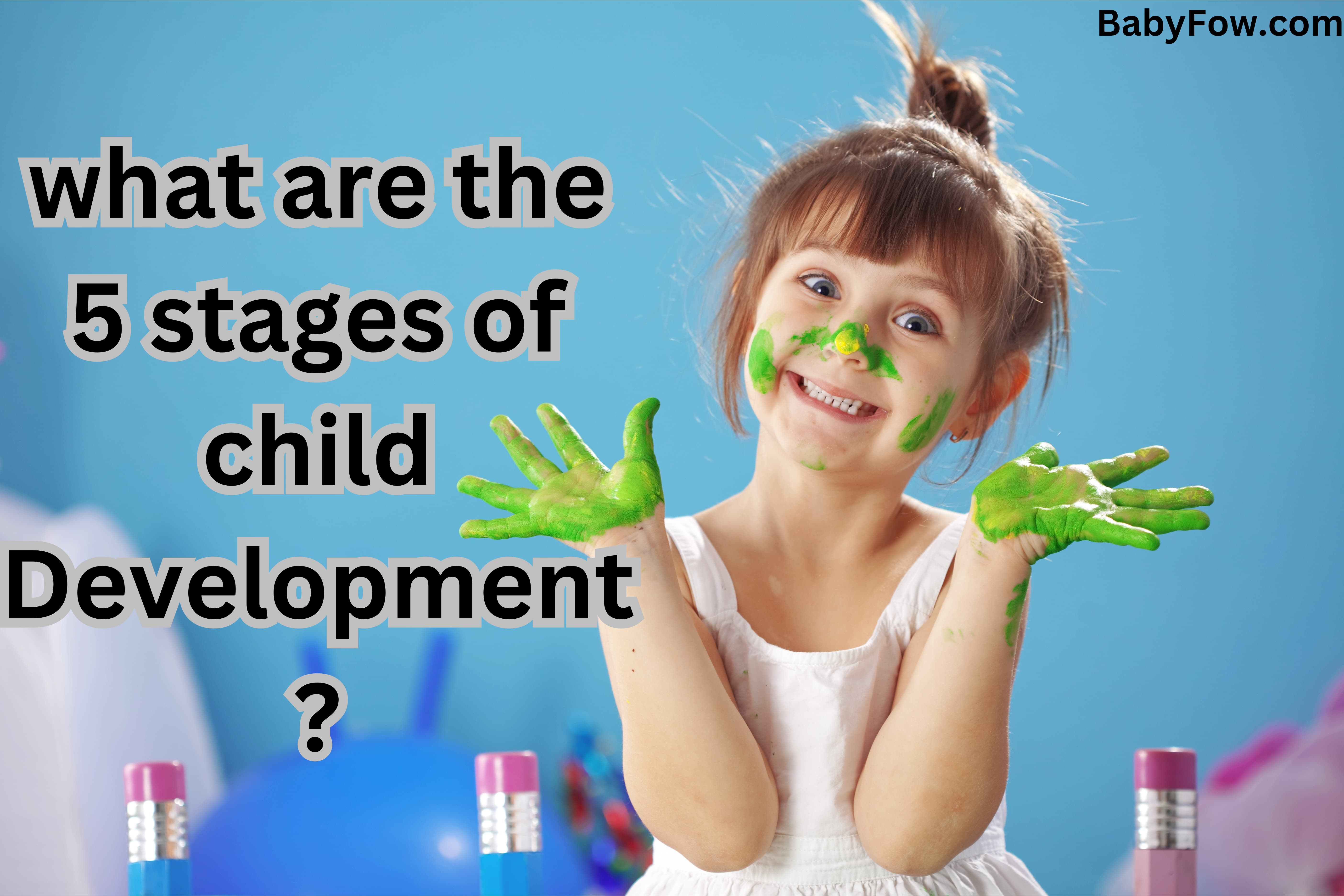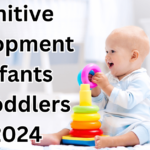Understanding the Five Stages of Child Development
Child development is a journey full of milestones and transformations. By understanding the five stages of child development, you can provide the support and environment your child needs to thrive. This guide will delve into each stage, offering insights into what to expect and how to support your child through these critical periods.
What Are the 5 Stages of Child Development?
The five stages of child development are:
- Infancy (Birth to 18 Months)
- Early Childhood (18 Months to 3 Years)
- Preschool (3 to 5 Years)
- Middle Childhood (6 to 12 Years)
- Adolescence (13 to 18 Years)
Stage 1: Infancy (Birth to 18 Months)
Key Developments:
- Physical Growth: Rapid increase in weight and height. Babies begin to control head movements, sit, crawl, and eventually walk.
- Sensory Development: Recognizing familiar faces and responding to facial expressions.
- Cognitive Skills: Learning through sensory experiences. Understanding object permanence.
- Emotional and Social Development: Developing attachment to caregivers and expressing emotions through crying and smiling.
How to Support:
- Physical Contact: Hold and cuddle your baby often to build a sense of security.
- Stimulation: Provide a variety of sensory experiences through toys, music, and interaction.
- Routine: Establish consistent routines for feeding, sleeping, and play to create a stable environment.
Stage 2: Early Childhood (18 Months to 3 Years)
Key Developments:
- Language Skills: Rapid vocabulary expansion and forming simple sentences.
- Motor Skills: Improved coordination, ability to walk, run, and climb.
- Cognitive Development: Beginning of symbolic thought and engaging in pretend play.
- Social Skills: Playing alongside other children (parallel play) and learning to share and take turns.
How to Support:
- Communication: Talk to your child frequently to boost language development.
- Playtime: Encourage imaginative play and provide a variety of toys.
- Social Interaction: Arrange playdates to develop social skills.
Stage 3: Preschool (3 to 5 Years)
Key Developments:
- Cognitive Skills: Counting, recognizing numbers and letters, understanding simple concepts.
- Language: More complex sentences and better understanding of grammar.
- Physical Skills: Improved balance and coordination, ability to ride tricycles, and engage in more physical play.
- Social and Emotional Development: Forming friendships and beginning to understand others’ perspectives.
How to Support:
- Educational Activities: Introduce basic educational concepts through games and activities.
- Physical Play: Provide opportunities for active play to develop motor skills.
- Emotional Support: Encourage expression of feelings and teach problem-solving skills.
Stage 4: Middle Childhood (6 to 12 Years)
Key Developments:
- Cognitive Skills: Mastery of reading, writing, and arithmetic. Developing critical thinking and problem-solving skills.
- Social Skills: Building stronger friendships, understanding social norms, and developing empathy.
- Emotional Development: Increased independence and development of self-esteem.
- Physical Growth: Steady physical growth and improvement in fine and gross motor skills.
How to Support:
- Academic Support: Help with homework and provide books and learning materials.
- Social Interaction: Encourage participation in group activities and sports.
- Emotional Support: Offer praise and support to build confidence.
Stage 5: Adolescence (13 to 18 Years)
Key Developments:
- Physical Changes: Puberty leads to rapid physical growth and sexual maturation.
- Cognitive Development: Development of abstract thinking and planning for the future.
- Emotional Development: Formation of identity, seeking independence, and exploring personal values.
- Social Skills: Navigating complex social relationships and understanding and managing emotions.
How to Support:
- Open Communication: Maintain open lines of communication to discuss changes and challenges.
- Independence: Provide opportunities for teens to make decisions and take responsibility.
- Guidance: Offer support and guidance in goal-setting and future planning.

Detailed Overview of Each Stage
Infancy (Birth to 18 Months)
Infancy is a time of rapid growth and development. During this stage, babies rely heavily on their caregivers for security and learning experiences. Here’s a more detailed look at the milestones and how you can support your child:
Physical Growth:
- Milestones: Rolling over, sitting up, crawling, standing, and beginning to walk.
- Support Tips: Provide a safe environment for exploration. Use baby-proofing measures to prevent injuries.
Sensory and Cognitive Development:
- Milestones: Recognizing faces, exploring objects with hands and mouth, beginning to understand cause and effect.
- Support Tips: Offer a variety of sensory experiences like different textures, sounds, and colors. Use toys that encourage exploration and problem-solving.
Emotional and Social Development:
- Milestones: Forming attachments, recognizing caregivers, expressing needs through crying or babbling.
- Support Tips: Respond promptly to your baby’s needs to build trust. Engage in eye contact and smile often.
Early Childhood (18 Months to 3 Years)
Early childhood is characterized by increased mobility and language development. Children become more curious and start to explore their environment more independently.
Physical and Motor Skills:
- Milestones: Walking independently, climbing stairs, running, and beginning to dress themselves.
- Support Tips: Provide safe spaces for physical activity. Encourage motor skill development through play.
Language Development:
- Milestones: Rapid vocabulary growth, forming simple sentences, and understanding basic instructions.
- Support Tips: Talk to your child regularly, read books together, and sing songs to enhance language skills.
Cognitive and Social Skills:
- Milestones: Engaging in pretend play, understanding basic concepts like colors and shapes, and beginning to play with other children.
- Support Tips: Provide opportunities for imaginative play. Encourage social interaction through playdates.
Preschool (3 to 5 Years)
Preschool years are when children start to develop more complex cognitive and social skills. They become more independent and start to form their own identities.
Cognitive Development:
- Milestones: Counting, recognizing letters and numbers, understanding time concepts like today, tomorrow, and yesterday.
- Support Tips: Use educational games and activities to reinforce learning. Encourage curiosity and answer their questions.
Physical Development:
- Milestones: Improved coordination and balance, ability to ride a tricycle, and better control over fine motor skills.
- Support Tips: Engage in activities that promote physical fitness and coordination, such as playing catch or riding a bike.
Social and Emotional Development:
- Milestones: Forming friendships, understanding others’ feelings, and developing a sense of self.
- Support Tips: Teach empathy and encourage cooperative play. Provide opportunities for your child to make choices.
Middle Childhood (6 to 12 Years)
During middle childhood, children develop critical thinking skills and gain a better understanding of the world around them. They also become more socially adept and emotionally resilient.
Cognitive Skills:
- Milestones: Mastering basic academic skills, developing problem-solving abilities, and starting to think more logically.
- Support Tips: Help with homework, provide educational resources, and encourage independent learning.
Physical Development:
- Milestones: Steady growth, improvement in fine and gross motor skills, and participation in organized sports.
- Support Tips: Promote physical activity through sports and outdoor play. Ensure a balanced diet for healthy growth.
Social and Emotional Development:
- Milestones: Building stronger friendships, developing a sense of morality, and becoming more self-aware.
- Support Tips: Foster a supportive environment, teach conflict resolution skills, and encourage participation in group activities.
Adolescence (13 to 18 Years)
Adolescence is a period of significant change, both physically and emotionally. Teens develop their identities and prepare for adult responsibilities.
Physical Changes:
- Milestones: Puberty, rapid growth, and sexual maturation.
- Support Tips: Provide accurate information about bodily changes and maintain open communication about health and wellness.
Cognitive Development:
- Milestones: Abstract thinking, planning for the future, and developing personal values.
- Support Tips: Encourage critical thinking and problem-solving. Support academic and career planning.
Emotional and Social Development:
- Milestones: Forming an identity, seeking independence, and navigating complex social relationships.
- Support Tips: Maintain open communication, provide guidance and support, and respect their need for independence.
READ MORE :
Cognitive development in infants and toddlers.
Comparison of Developmental Stages
| Stage | Age Range | Key Developments | How to Support |
|---|---|---|---|
| Infancy | Birth to 18 months | Physical growth, sensory development, emotional attachment | Physical contact, sensory stimulation, consistent routine |
| Early Childhood | 18 months to 3 years | Language skills, motor skills, cognitive and social skills | Communication, playtime, social interaction |
| Preschool | 3 to 5 years | Cognitive skills, physical skills, social and emotional development | Educational activities, physical play, emotional support |
| Middle Childhood | 6 to 12 years | Cognitive skills, physical growth, social and emotional development | Academic support, social interaction, emotional support |
| Adolescence | 13 to 18 years | Physical changes, cognitive development, emotional and social growth | Open### Developmental Stages Comparison Table |
| Stage | Age Range | Key Developments | How to Support |
|---|---|---|---|
| Infancy | Birth to 18 months | Rapid physical growth, sensory development, emotional attachment | Physical contact, sensory stimulation, consistent routine |
| Early Childhood | 18 months to 3 years | Language skills, motor skills, cognitive and social skills | Communication, playtime, social interaction |
| Preschool | 3 to 5 years | Cognitive skills, physical skills, social and emotional development | Educational activities, physical play, emotional support |
| Middle Childhood | 6 to 12 years | Cognitive skills, physical growth, social and emotional development | Academic support, social interaction, emotional support |
| Adolescence | 13 to 18 years | Physical changes, cognitive development, emotional and social growth | Open communication, independence, guidance |
Stage 1: Infancy (Birth to 18 Months)
Detailed Overview
Physical Growth:
- Milestones: Rolling over, sitting up, crawling, standing, beginning to walk.
- Support Tips: Provide a safe environment for exploration, such as baby-proofing the house to prevent injuries.
Sensory and Cognitive Development:
- Milestones: Recognizing faces, exploring objects with hands and mouth, beginning to understand cause and effect.
- Support Tips: Offer a variety of sensory experiences like different textures, sounds, and colors. Use toys that encourage exploration and problem-solving.
Emotional and Social Development:
- Milestones: Forming attachments, recognizing caregivers, expressing needs through crying or babbling.
- Support Tips: Respond promptly to your baby’s needs to build trust. Engage in eye contact and smile often.
Stage 2: Early Childhood (18 Months to 3 Years)
Detailed Overview
Physical and Motor Skills:
- Milestones: Walking independently, climbing stairs, running, beginning to dress themselves.
- Support Tips: Provide safe spaces for physical activity. Encourage motor skill development through play.
Language Development:
- Milestones: Rapid vocabulary growth, forming simple sentences, understanding basic instructions.
- Support Tips: Talk to your child regularly, read books together, and sing songs to enhance language skills.
Cognitive and Social Skills:
- Milestones: Engaging in pretend play, understanding basic concepts like colors and shapes, beginning to play with other children.
- Support Tips: Provide opportunities for imaginative play. Encourage social interaction through playdates.
Stage 3: Preschool (3 to 5 Years)
Detailed Overview
Cognitive Development:
- Milestones: Counting, recognizing letters and numbers, understanding time concepts like today, tomorrow, and yesterday.
- Support Tips: Use educational games and activities to reinforce learning. Encourage curiosity and answer their questions.
Physical Development:
- Milestones: Improved coordination and balance, ability to ride a tricycle, better control over fine motor skills.
- Support Tips: Engage in activities that promote physical fitness and coordination, such as playing catch or riding a bike.
Social and Emotional Development:
- Milestones: Forming friendships, understanding others’ feelings, developing a sense of self.
- Support Tips: Teach empathy and encourage cooperative play. Provide opportunities for your child to make choices.
Stage 4: Middle Childhood (6 to 12 Years)
Detailed Overview
Cognitive Skills:
- Milestones: Mastering basic academic skills, developing problem-solving abilities, starting to think more logically.
- Support Tips: Help with homework, provide educational resources, and encourage independent learning.
Physical Development:
- Milestones: Steady growth, improvement in fine and gross motor skills, participation in organized sports.
- Support Tips: Promote physical activity through sports and outdoor play. Ensure a balanced diet for healthy growth.
Social and Emotional Development:
- Milestones: Building stronger friendships, developing a sense of morality, becoming more self-aware.
- Support Tips: Foster a supportive environment, teach conflict resolution skills, and encourage participation in group activities.
Stage 5: Adolescence (13 to 18 Years)
Detailed Overview
Physical Changes:
- Milestones: Puberty, rapid growth, and sexual maturation.
- Support Tips: Provide accurate information about bodily changes and maintain open communication about health and wellness.
Cognitive Development:
- Milestones: Abstract thinking, planning for the future, developing personal values.
- Support Tips: Encourage critical thinking and problem-solving. Support academic and career planning.
Emotional and Social Development:
- Milestones: Forming an identity, seeking independence, navigating complex social relationships.
- Support Tips: Maintain open communication, provide guidance and support, and respect their need for independence.
Tips for Supporting Each Developmental Stage
Infancy (Birth to 18 Months)
- Physical Contact: Hold and cuddle your baby often to build a sense of security.
- Stimulation: Provide a variety of sensory experiences through toys, music, and interaction.
- Routine: Establish consistent routines for feeding, sleeping, and play to create a stable environment.
Early Childhood (18 Months to 3 Years)
- Communication: Talk to your child frequently to boost language development.
- Playtime: Encourage imaginative play and provide a variety of toys.
- Social Interaction: Arrange playdates to develop social skills.
Preschool (3 to 5 Years)
- Educational Activities: Introduce basic educational concepts through games and activities.
- Physical Play: Provide opportunities for active play to develop motor skills.
- Emotional Support: Encourage expression of feelings and teach problem-solving skills.
Middle Childhood (6 to 12 Years)
- Academic Support: Help with homework and provide books and learning materials.
- Social Interaction: Encourage participation in group activities and sports.
- Emotional Support: Offer praise and support to build confidence.
Adolescence (13 to 18 Years)
- Open Communication: Maintain open lines of communication to discuss changes and challenges.
- Independence: Provide opportunities for teens to make decisions and take responsibility.
- Guidance: Offer support and guidance in goal-setting and future planning.
Why Understanding These Stages is Important
Understanding these developmental stages is crucial for several reasons:
- Tailored Support: Knowing what to expect at each stage allows you to provide the appropriate support and resources.
- Early Intervention: Identifying potential developmental delays early can lead to timely interventions, improving outcomes.
- Strengthening Bonds: Being aware of your child’s developmental needs helps strengthen the parent-child relationship.
- Promoting Well-being: Providing the right environment and support promotes overall well-being and future success.
By recognizing and supporting these developmental stages, you can ensure a healthy, happy, and well-rounded growth for your child. For more detailed information, you can visit resources such as UConn KIDS and The Child Development Guide.
Understanding what are the 5 stages of child development is key to fostering an environment that nurtures your child’s growth and prepares them for a successful future.









Pingback: When Is My Baby Too Big For Infant Car Seat - Babyfow.com